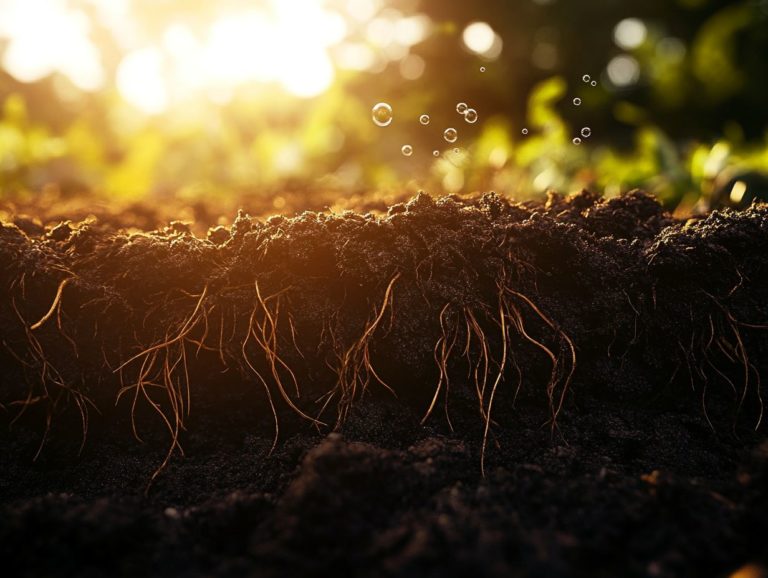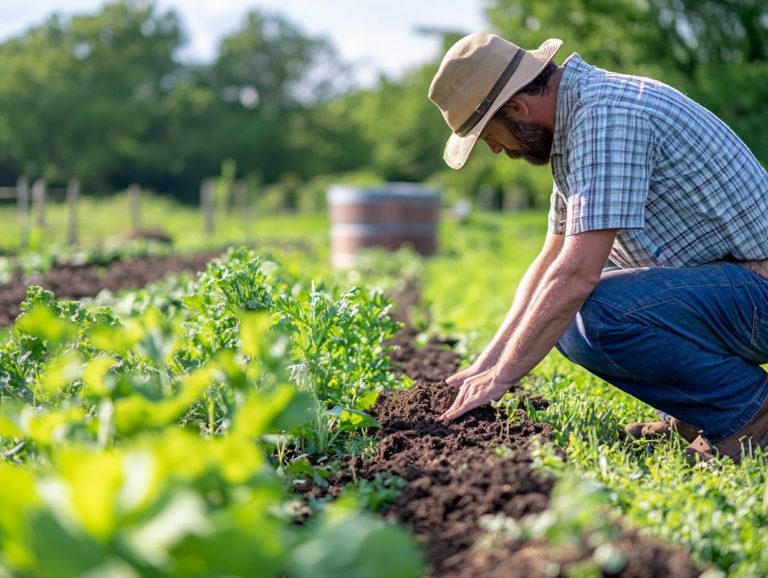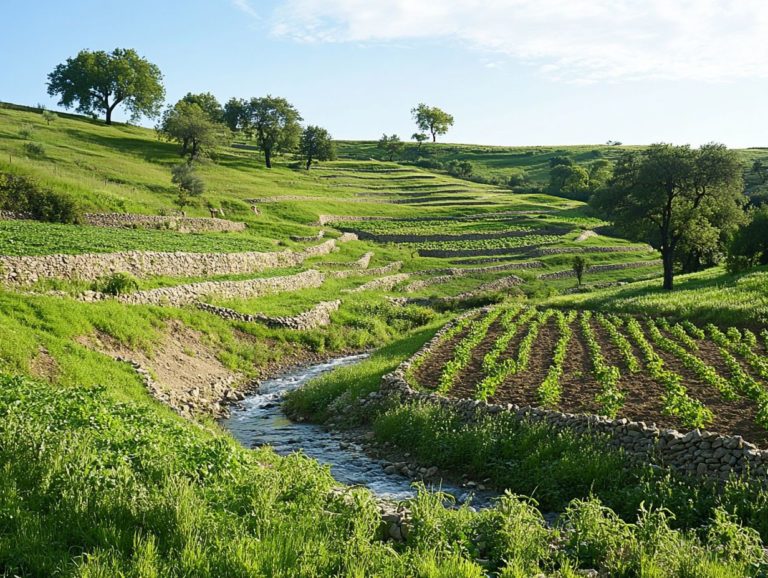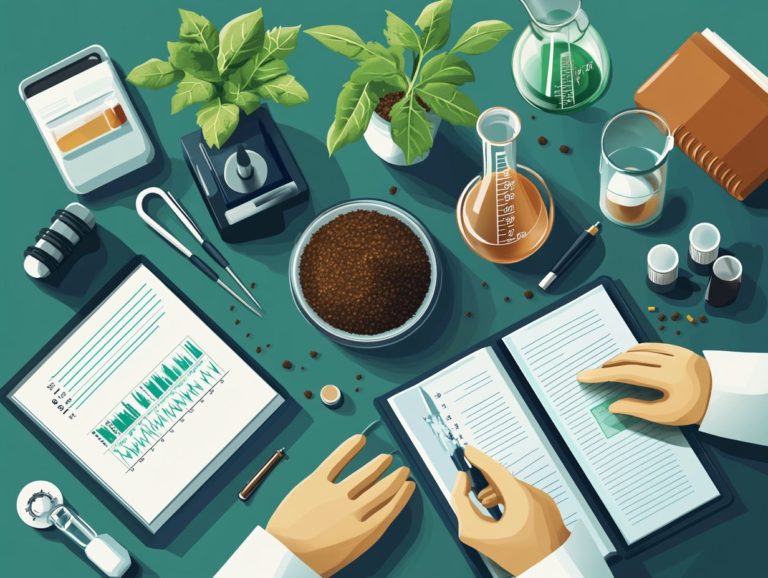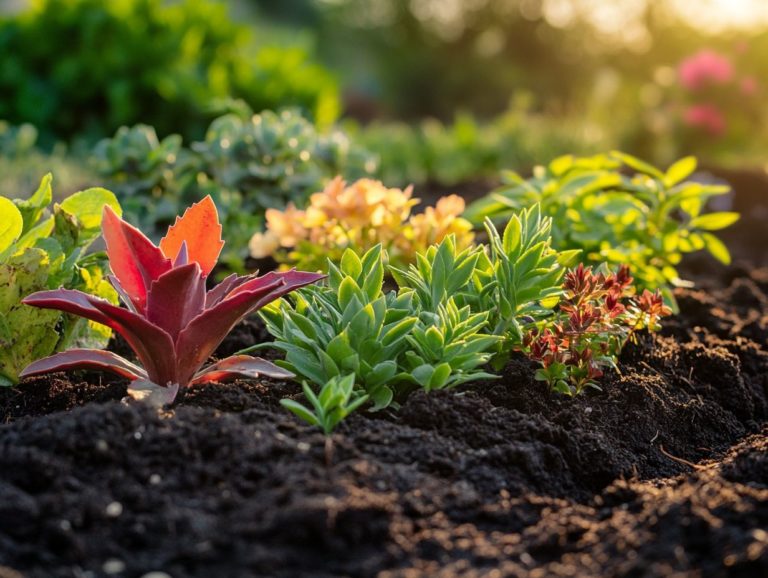5 Myths About Soil Health Debunked
Soil health is frequently misunderstood, often shrouded in myths that can misguide both gardeners and farmers. Don t let these myths hinder your gardening success!
You might think that fertilizers are the only answer to enhancing soil quality or that tilling is crucial for maintaining healthy soil. These misconceptions can seriously obstruct effective practices.
This article sets the record straight by debunking five common myths about soil health, delving into its importance and providing insights on how to assess and naturally improve your soil.
Discover the truths that can pave the way for healthier crops and a more sustainable environment.
Contents
- Key Takeaways:
- 1. Myth #1: Fertilizers Are the Only Way to Improve Soil Health
- 2. Myth #2: Tilling Is Necessary for Healthy Soil
- 3. Myth #3: More Water Equals Healthier Soil
- 4. Myth #4: Pesticides Are Essential for Protecting Soil
- 5. Myth #5: Soil Health Can’t Be Measured or Improved
- What Is Soil Health and Why Is It Important?
- Frequently Asked Questions
- What are the top 5 myths about soil health?
- Is it true that healthy soil relies on chemical fertilizers?
- Do I need to till my soil for it to be healthy?
- Is organic farming less productive than conventional farming?
- Does soil quality have an impact on crop quality?
- Are pesticides necessary for successful farming?
Key Takeaways:
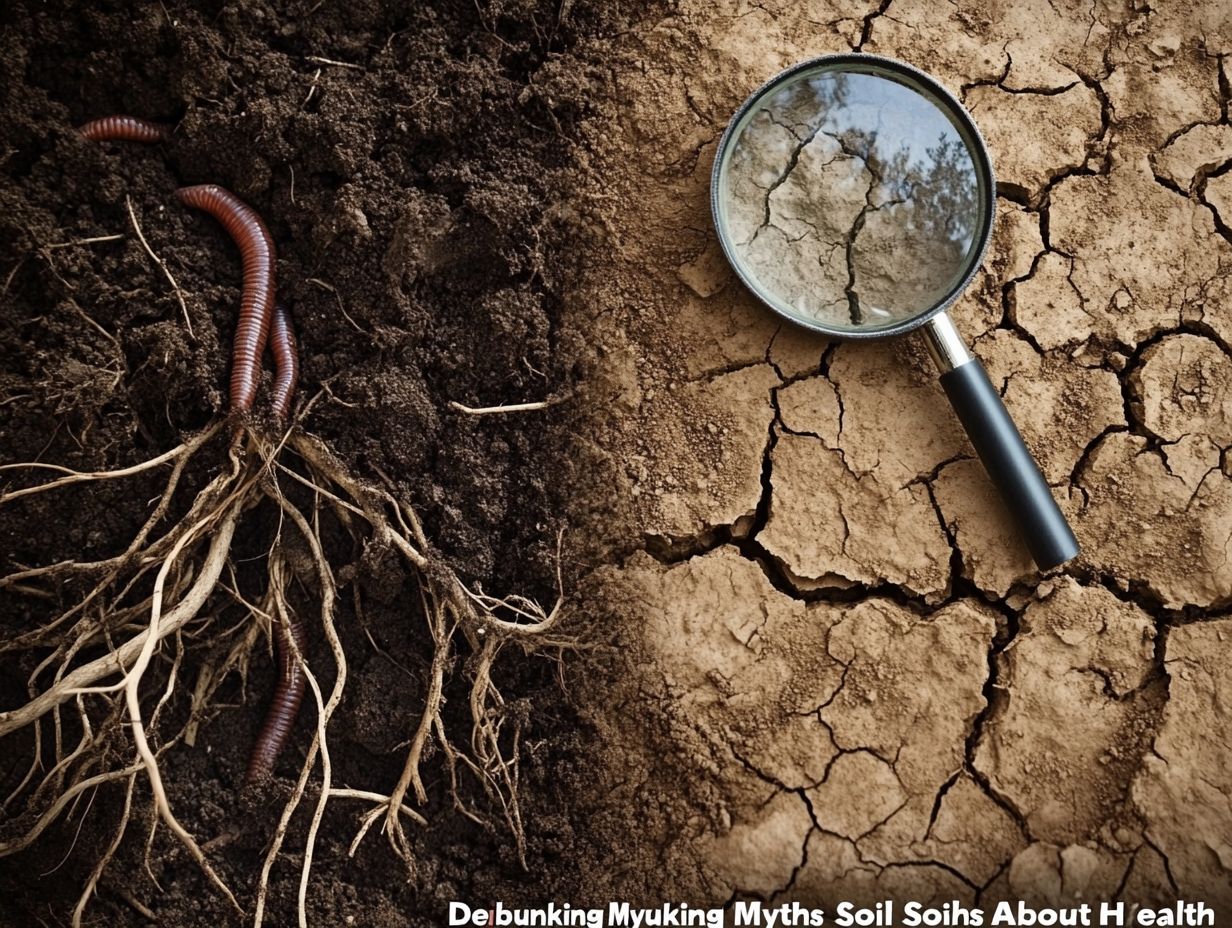
- Fertilizers are not the only way to improve soil health. Adopting natural methods such as crop rotation and composting can also effectively enhance soil health.
- Contrary to popular belief, tilling is not necessary for healthy soil. In fact, it can lead to erosion and disrupt beneficial microorganisms in the soil. Adopting no-till farming practices can promote soil health.
- More water does not necessarily mean healthier soil. Overwatering can lead to nutrient leaching and waterlogging, which can harm soil health. Proper irrigation practices and mulching can help maintain optimal soil moisture levels.
1. Myth #1: Fertilizers Are the Only Way to Improve Soil Health
Many gardeners might think fertilizers are the only way to boost soil health, but this misconception overlooks the vital contributions of organic matter and diverse amendments. Organic matter refers to decomposed plant and animal materials that improve soil quality. These elements enrich soil fertility and structure.
By incorporating these natural substances, you can significantly enhance your soil’s nutrient profile. For example, banana peels are packed with potassium, essential for plant vitality and flowering, while coffee grounds offer a nitrogen boost that amplifies microbial activity.
Eggshells not only introduce calcium but also gradually improve soil pH, which indicates its acidity or alkalinity, impacting nutrient availability, over time. The RHS Advisory Team highlights that using these organic amendments can improve aeration and drainage, creating a more resilient ecosystem in your garden.
By embracing these sustainable practices, you can cultivate thriving plants while nurturing the earth beneath them.
2. Myth #2: Tilling Is Necessary for Healthy Soil
The idea that tilling is crucial for maintaining healthy soil is a common gardening myth; in truth, excessive tilling can disrupt the delicate soil structure and harm essential microorganisms that contribute to soil fertility and plant growth.
When you disturb the soil too much, you not only undermine the beneficial microbial community but also diminish the organic matter that is critical for nutrient retention. As the soil’s aeration and water retention capabilities wane, it becomes increasingly inhospitable for robust plant roots.
This disruption can increase erosion, which isn’t good for your garden, and lead to a decline in the overall health of the ecosystem. On the flip side, practices like cover cropping, applying mulch, and embracing no-till farming cultivate a vibrant soil environment that enhances fertility, fosters biodiversity, and retains moisture.
It s clear that adopting less invasive techniques can lead to more sustainable agricultural benefits.
3. Myth #3: More Water Equals Healthier Soil
A common misconception you might encounter in gardening is the belief that more water leads to healthier soil. However, overwatering can actually harm your soil’s health, particularly in clay soil, where poor drainage can become a significant issue.
Consider the natural conditions of your environment: watering during direct sunlight can cause rapid evaporation, leaving your plants thirstier than ever.
To combat this, you can employ several effective strategies to enhance drainage:
- Amending soil with organic matter like compost
- Utilizing raised garden beds
Implementing drip irrigation systems allows you to provide a steady flow of water directly to the roots while preventing puddling. Monitoring moisture levels with mulch helps regulate soil temperature and retains essential water, ensuring your plants receive just the right amount without the risk of overwatering.
Join the movement toward healthier plants and a thriving environment by understanding the truth about soil health!
4. Myth #4: Pesticides Are Essential for Protecting Soil
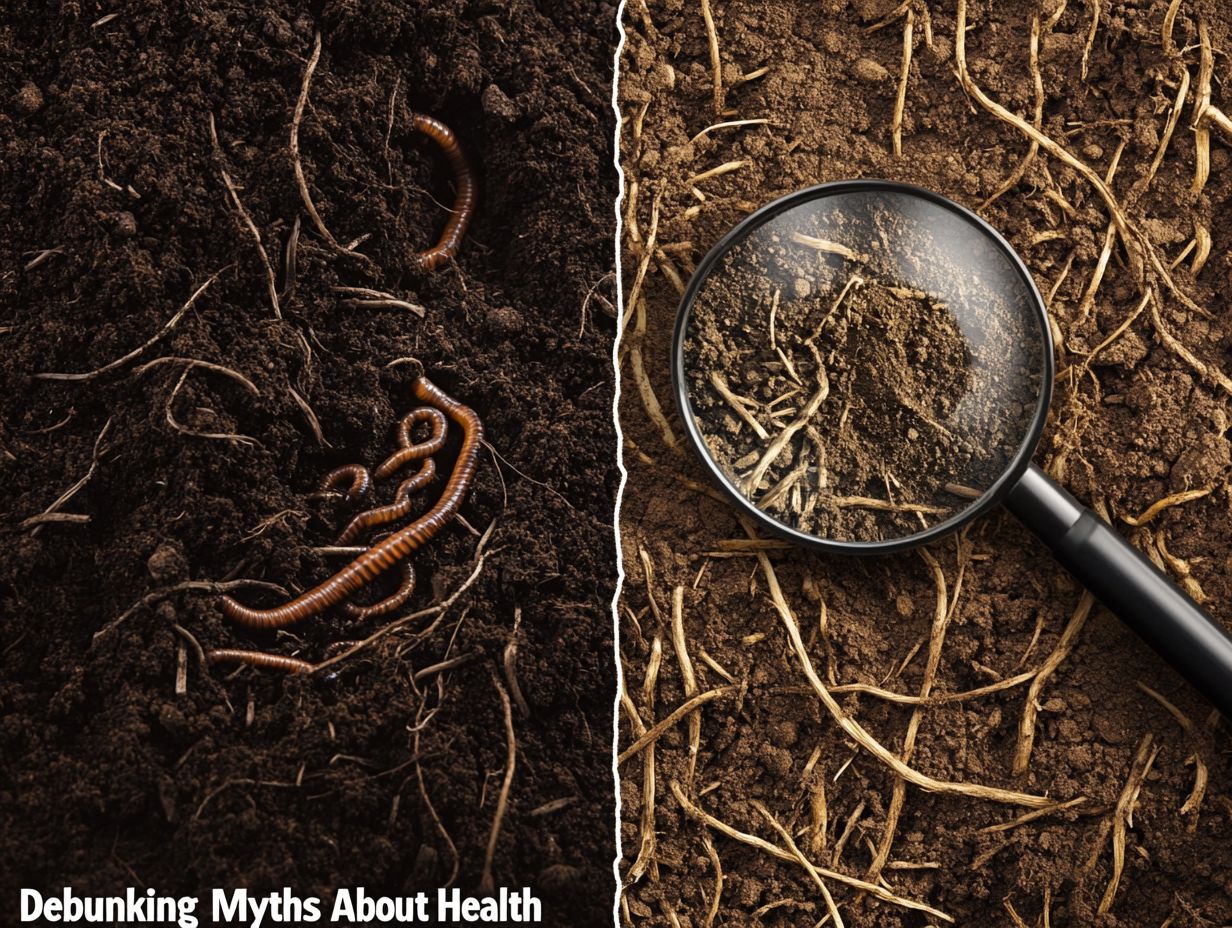
The notion that pesticides are critical for soil protection is a common gardening myth. This myth undermines the effectiveness of natural alternatives and organic practices designed to enhance soil health and promote robust plant growth.
In reality, relying on synthetic pesticides can harm your garden! These substances disrupt the intricate balance of beneficial microorganisms, which are crucial for nutrient cycling the process of nutrients moving through the ecosystem and maintaining soil structure. These chemicals often leave persistent residues that adversely affect vital soil organisms, such as earthworms and mycorrhizal fungi, a type of fungus that helps plants absorb nutrients.
Instead, consider embracing practices like crop rotation, cover cropping, and composting. These practices can notably boost soil fertility while preserving its microbial community. Natural pest deterrents, such as neem oil or garlic spray, offer effective alternatives that foster a flourishing ecosystem, ensuring both soil health and plant vitality for the long haul.
5. Myth #5: Soil Health Can’t Be Measured or Improved
The idea that soil health is unmeasurable and unchangeable is a common gardening myth. In reality, soil testing offers invaluable insights into nutrient levels, pH, and composition, giving you the power to make informed amendments that dramatically improve soil health.
By employing various testing methods, including laboratory analyses and DIY kits, you can gain a thorough understanding of your soil’s condition. Interpreting these results is key. They will illuminate any nutrient deficiencies, whether it s nitrogen, phosphorus, or potassium.
Implement targeted soil amendments, like organic compost, manure, or green manures, to make nutrients more available and improve soil structure. Adding materials such as leaf mold, biochar, or worm castings not only elevates soil fertility but also boosts its ability to retain moisture and support beneficial microbial life. This holistic approach ensures your garden thrives in a robust ecosystem.
What Is Soil Health and Why Is It Important?
Soil health is all about its capacity to sustain plant growth, support microbial activity, and retain essential nutrients. Grasping its significance is crucial for honing your gardening practices. Healthy soil nurtures vigorous plant development and contributes to the overall vitality of the ecosystem.
Key traits that define soil health include its structure, which affects how effectively water and air can penetrate. The organic matter content enriches the soil and boosts fertility. When you foster vibrant microbial activity, you’re enabling the decomposition of organic materials, making vital nutrients accessible to your plants.
By prioritizing these factors, you enhance plant vigor and promote a balanced ecosystem that allows beneficial organisms to flourish. This interconnectedness elevates pollination, pest control, and nutrient cycling, ultimately leading to more productive and sustainable gardening outcomes.
What Are the Key Factors That Contribute to Soil Health?
Key factors that contribute to your soil health include the presence of organic matter, balanced nutrient levels, optimal soil structure, and a diverse microbial community that works together to promote plant growth and fertility.
These elements interact in intricate ways, forming a vibrant ecosystem that supports various plant species and encourages biodiversity. For instance, incorporating organic materials like compost, aged manure, and green manure can significantly boost your soil’s organic matter content. This enhances both its structure and moisture retention.
Maintaining balanced nutrient levels ensures that essential elements, such as nitrogen, phosphorus, and potassium, are readily available for your plants’ uptake. The diverse microbial community, which includes bacteria, fungi, and protozoa, plays a pivotal role in breaking down organic materials and cycling nutrients, further enriching your soil.
Together, these factors create a robust foundation for sustainable agriculture and thriving ecosystems, setting the stage for your gardening success.
How Can One Assess the Health of Their Soil?
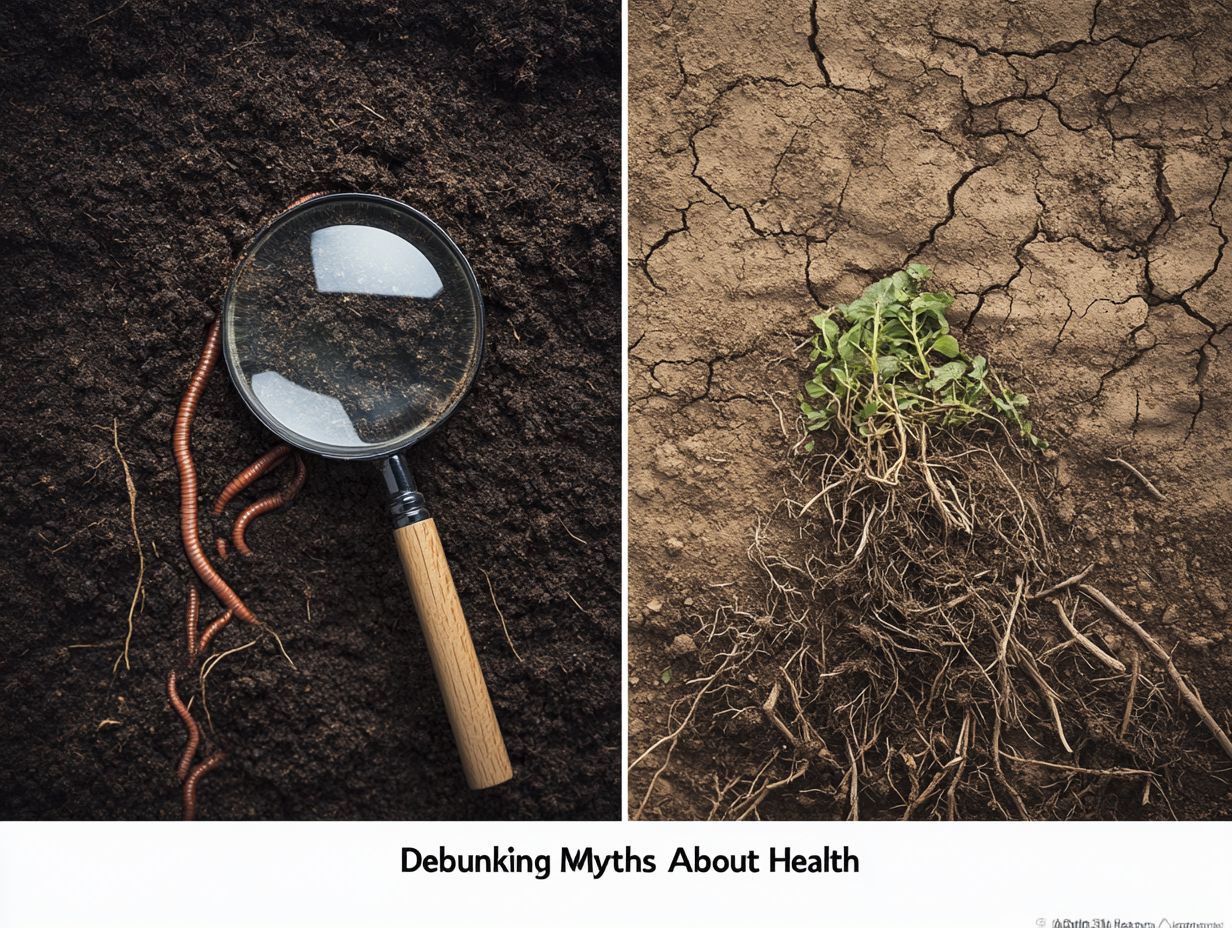
Assessing your soil’s health is essential. Methods like soil testing provide valuable insights.
Measuring pH levels, nutrient content, and organic matter gives you key data. This information helps you manage your soil better.
When you perform a soil test, you can identify specific needs and deficiencies. This enables you to tailor your approach with precision.
Start by collecting samples from various spots in your garden. This ensures an accurate representation of your soil’s overall condition.
Once you send these samples to a lab or use a DIY test kit, you ll receive results that reveal essential information about nutrient availability and soil acidity.
With this knowledge, you can improve your soil using organic fertilizers, compost, or pH adjusters.
Tools like soil moisture meters and pH testers, along with resources from local agricultural extensions, can elevate your gardening outcomes and promote healthy, thriving plants.
What Are Some Natural Ways to Improve Soil Health?
To enhance your soil health naturally, consider incorporating organic matter by using compost. You can also use soil amendments such as banana peels, coffee grounds, and eggshells.
Embracing gardening practices that improve soil structure and foster microbial life is equally vital. These methods enrich your soil and cultivate a balanced ecosystem that supports robust plant growth.
For example, composting kitchen scraps and yard waste recycles nutrients while enhancing moisture retention. This means less frequent watering for you.
In terms of soil amendments, banana peels provide potassium, essential for flowering and fruiting. Coffee grounds are packed with nitrogen, promoting lush, leafy growth. Crushed eggshells deliver calcium, crucial for preventing blossom end rot in your tomatoes.
You can easily collect these materials and add them directly to your planting beds or compost bins to reap their benefits.
Practices like crop rotation and cover cropping boost soil health. They prevent nutrient depletion and erosion, ensuring your garden thrives year after year.
How Can Soil Health Impact Crop Yield and Quality?
Soil health profoundly impacts your crop yield and quality. The availability of nutrients, the structure of the soil, and the activity of microorganisms are vital components that support robust plant growth.
When your soil is rich in organic matter and essential nutrients, your plants thrive and resist diseases better. This enhances their quality. For example, vegetables grown in well-aerated, nutrient-dense soil often have superior flavor and nutritional content.
By adopting practices like cover cropping or reduced tillage, you can significantly enhance soil biodiversity. This leads to healthier root systems and improved water retention.
This holistic approach elevates productivity and fosters sustainable farming practices. It ensures that your land remains fertile for generations to come.
What Are the Long-Term Effects of Neglecting Soil Health?
Neglecting soil health can have long-lasting, detrimental effects. These manifest as soil degradation, nutrient depletion, and reduced plant growth. All of these jeopardize the sustainability of your gardening and agricultural endeavors.
As time goes on, poor soil management can spiral into a vicious cycle that diminishes crop yields and undermines the overall environmental health of your area.
When soil becomes stripped of essential nutrients, it loses its ability to support vigorous plant life. This often leads to increased reliance on chemical fertilizers, which can escalate soil toxicity and biodiversity loss.
Unhealthy soil can also contribute to erosion and water runoff, adversely impacting surrounding ecosystems.
To stave off these challenges, it’s crucial to adopt sustainable practices such as:
- Crop rotation
- Cover cropping
- Organic amendments
By implementing these strategies, you can enhance soil fertility and ensure its vitality for generations to come.
Frequently Asked Questions
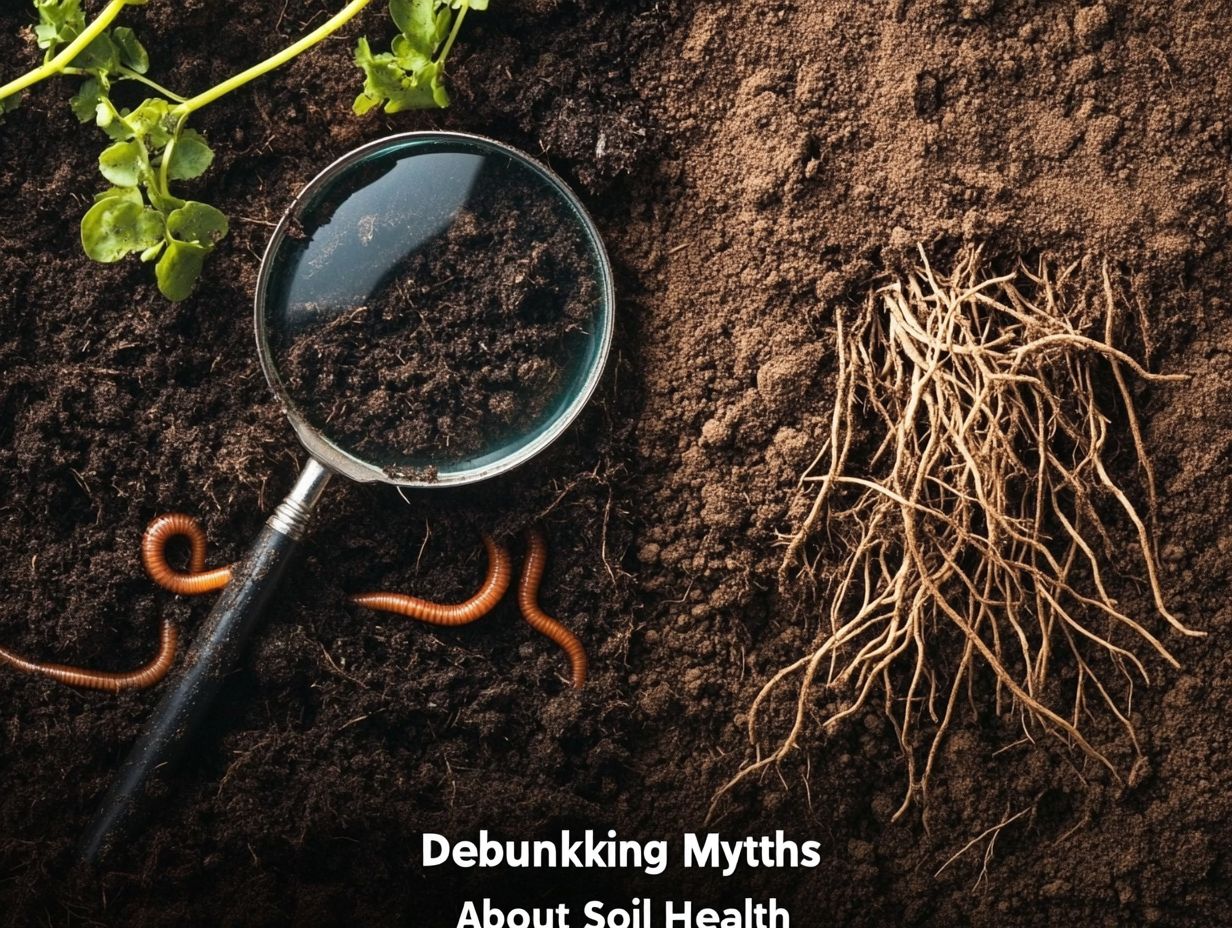
What are the top 5 myths about soil health?
- Healthy soil thrives on natural methods, not just chemical crutches!
- Tilling is necessary for healthy soil.
- Organic farming isn’t as productive as conventional farming.
- Soil quality doesn’t affect crop quality.
- Pesticides are necessary for successful farming.
These misconceptions can mislead farmers and gardeners alike.
Is it true that healthy soil relies on chemical fertilizers?
No, healthy soil doesn’t rely solely on chemical fertilizers. Using too many can actually harm soil health. Consider alternatives like compost or cover crops for better results.
Do I need to till my soil for it to be healthy?
You don’t need to till your soil for health. Tilling disrupts soil structure and harms beneficial microorganisms. No-till farming and reduced tillage are effective alternatives.
Is organic farming less productive than conventional farming?
No way! Organic farming can be just as productive, if not more! It often leads to better soil health and improved crop yields over time.
Does soil quality have an impact on crop quality?
Absolutely! Healthy soil is packed with nutrients that help plants thrive and defend against pests. Poor soil results in lower yields and quality.
Are pesticides necessary for successful farming?
Pesticides aren t the only way to farm successfully. Overusing them can harm beneficial insects and soil health. Try integrated pest management techniques instead.

